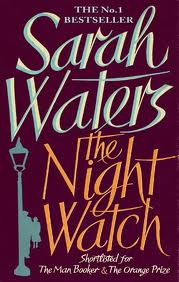Our book choice for August 2012 is The Night Watch by Sarah Waters. The novel, which is told backward through third-person narrative, takes place in 1940s London during and after World War II. Moving back through the 1940s, through air raids, blacked out streets, illicit liaisons, sexual adventure, to end with its beginning in 1941, The Night Watch is compelling.
The Night Watch is a 2006 historical fiction novel by Sarah Waters. It was shortlisted for both the 2006 Man Booker Prize and the 2006 Orange Prize. The novel, which is told backward through third-person narrative, takes place in 1940s London during and after World War II. The storyline follows the fragmented lives and the strange interconnections between Kay, Helen and Julia, three lesbians; Viv, a straight woman; and Duncan, her brother, whose sexuality is ambiguous.
The novel begins in 1947 with Kay Langrish, a woman broken by the war. She spends her days locked in her room in London, her only human contact being with another lesbian, Mickey. One night, Viv appears and hands Kay a gold ring. Viv works as an assistant to Helen, who runs a match-making agency near Bond Street. When Helen’s girlfriend Julia doesn’t come home one night, Helen is overcome with worry and jealousy.
The novel then moves back in time to 1944, when Kay, Helen, and Julia were all working as ambulance drivers during the Blitz. Kay is a brash and impulsive young woman who is drawn to danger. Helen is a more reserved and thoughtful woman who is struggling to come to terms with her sexuality. Julia is a beautiful and mysterious woman who is keeping a secret from her friends.
The three women are all affected by the war in different ways. Kay is traumatized by the violence she sees, and she begins to question her own sanity. Helen is forced to confront her own prejudices about homosexuality, and she begins to develop feelings for Kay. Julia is forced to make difficult choices about her safety and her future.
As the novel progresses, we learn more about the relationships between the characters. We see how they have been shaped by the war, and how they are struggling to find their place in the world. We also see how their lives are interconnected in unexpected ways.
The Night Watch is a complex and beautifully written novel that explores the themes of love, loss, and redemption. It is a story about the power of friendship, the importance of finding your own truth, and the resilience of the human spirit.
Here are some additional details about the novel:
- The novel is told in a non-linear fashion, moving back and forth in time. This allows the reader to see how the characters’ lives have been shaped by the war, and how their relationships have evolved over time.
- The novel is set in London during the Blitz. This setting provides a backdrop of danger and uncertainty, which adds to the suspense and tension of the story.
- The novel features a diverse cast of characters, including lesbians, straight women, and a man whose sexuality is ambiguous. This diversity reflects the changing social landscape of postwar London.
- The novel explores the themes of love, loss, and redemption. It is a story about the power of friendship, the importance of finding your own truth, and the resilience of the human spirit.
Discussion Questions
- If you’d been alive during WW2 would you have taken part, or fought, or been a conscientious objector?
- What did you think of the structure of the book? Would the narrative have been different if linear and not told backwards? What difference did telling it backwards make?
- The book is partially at least about secrets. How did you find the ‘reveals’ for each character? Were any of them disappointing? Satisfying? What did you think about the end being their beginnings?
- What do you make of the Duncan/ Mundy/ Fraser triangle? Is Duncan still in prison even after release?
- We know lots already about WW2 but did you learn anything new about that period? For instance, did you know prisoners were kept in their cells during air raids whilst the guards hid in the shelters?
- Did the author effectively capture the essence and feel of that period?
- The book is about several characters with overlapping plot lines but no one character represents the heart of the book – how did this affect your reading of it? Would you have preferred it to be about one central character? Do you feel closer to any one character?
- Did you spot Martina Cole’s name?
- Would you read anything else by Sarah Waters?
Individual Ratings
DKB Rating 





